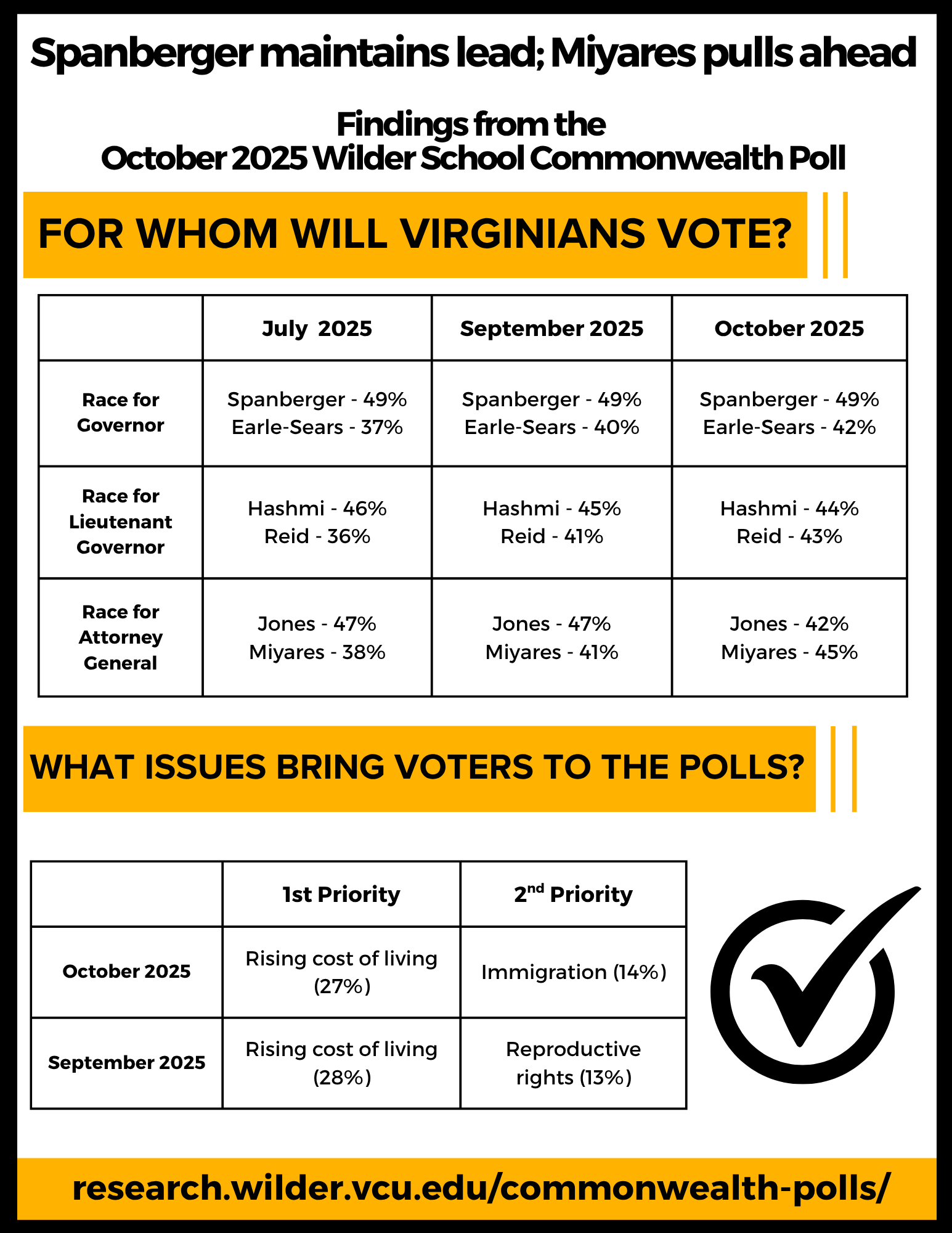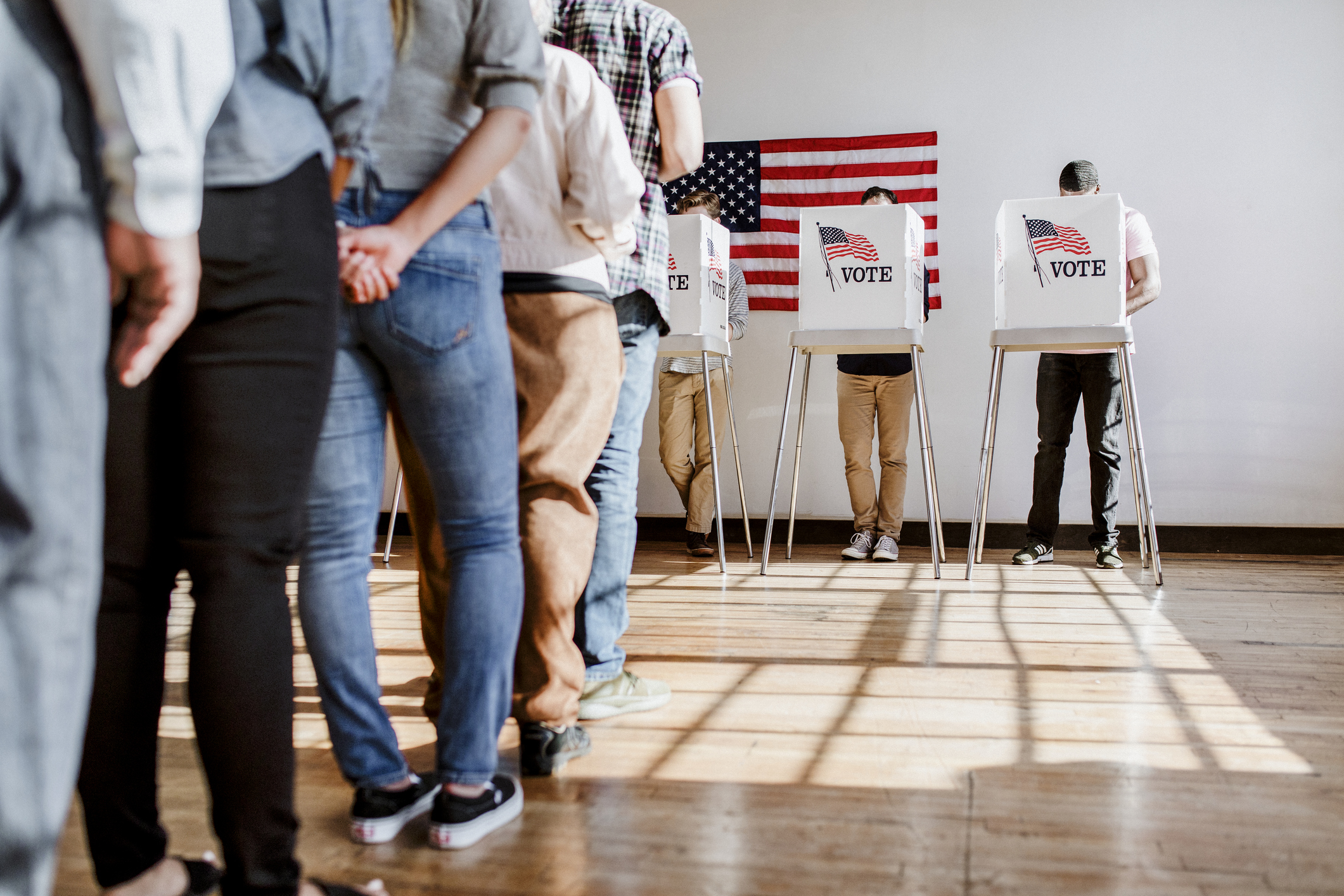Virginia Commonwealth University
FOR IMMEDIATE RELEASE
L. Douglas Wilder
Distinguished Professor
804-827-0776
ldwilder@vcu.edu
Robyn McDougle
Associate Dean of Research and Outreach
804-721-6703
rdmcdougle@vcu.edu
Margin narrows by 2 points since last month, 5 points since August
Race tightens to one point in Lieutenant Governor’s race; Miyares takes lead in attorney general’s race
RICHMOND, Va. (October 23, 2025) - The L. Douglas Wilder School of Government and Public Affairs at Virginia Commonwealth University today released findings from its latest Commonwealth Poll, conducted between Oct. 6-14. The poll captures voter sentiment ahead of Virginia’s 2025 statewide election, providing insights into candidate matchups, voter priorities and the issues most important to Virginians.
L. Douglas Wilder, the 66th governor of Virginia and distinguished professor at the Wilder School, said the findings underscore how closely Virginians are following this year’s statewide races.
"Our school’s poll results reflect little change in the race for governor, though the lead for Democrats has narrowed (Spanberger 49% to Earle-Sears 42%). The race for lieutenant governor shows John Reid within one percentage point of Ghazala Hashmi (Hashmi 44% to Reid 43%). The attorney general’s race shows Jason Miyares moving into the lead over Jay Jones (Miyares 45% to Jones 42%). These results highlight that, with several weeks to go before the election, voters are paying attention to what the candidates are doing—and what they have done—as a precursor to what they will do if elected." - Gov. L. Douglas Wilder

Statewide races
Among registered voters, former Congresswoman Abigail Spanberger leads Lt. Gov. Winsome Earle-Sears 49% to 42%, down from a 9-point margin reported in the September Commonwealth Poll conducted in August. Spanberger leads independent voters 35% to 24% for Lt. Gov. Earle-Sears with 20% undecided.
In the race for lieutenant governor, Sen. Ghazala Hashmi holds a 44% to 43% edge over John Reid, compared with a 4-point advantage in the most recent Commonwealth Poll. Notably, Attorney General Jason Miyares leads Former Del. Jay Jones 45% to 42%, a net 9-point swing since the last Commonwealth Poll.
Margins are tightening across all three statewide contests, with the most notable movement in the attorney general’s race, which has drawn national attention following reports of violent political text messages sent by Jones in 2022.
Top issues influencing voters
When asked which issue would most influence their vote in the upcoming election, 27% of registered voters identified the rising cost of living, followed by immigration at 14% and women’s reproductive rights at 12%. This is a flip in second and third issues with immigration moving up one spot and women’s reproductive rights dropping to third.
Control of the House of Delegates
Among registered voters, 47% say they want a Democrat majority in the House of Delegates and 44% say they want Republican control of the House of Delegates. Among independent voters, 28% want control to remain with the Democrat party and 23% say that they want the Republican party to have a majority. Almost half of independent voters had no opinion or didn’t know.
###
About the L. Douglas Wilder School of Government and Public Affairs at VCU
Ranked in the top 15% of graduate schools of public affairs in the nation by U.S. News & World Report — No. 39 among the top 40 Graduate Schools of Public Affairs, No. 6 in Homeland Security, and No. 33 in Public Management and Leadership — the L. Douglas Wilder School of Government and Public Affairs at Virginia Commonwealth University advances excellence in governance and promotes evidence-based public policy across Virginia and beyond.
The school offers a range of graduate, post-baccalaureate, and doctoral programs in key policy areas, including criminal justice; homeland security and emergency preparedness; public administration; public policy and administration; and urban and regional planning.
Additionally, the Wilder School is home to robust Centers and Institutes for Public Policy, which provide applied research and services in state and local government, social equity, and leadership to clients in government, nonprofit organizations, businesses, and the general public. Learn more at wilder.vcu.edu.
About VCU and VCU Health
Virginia Commonwealth University is a major, urban public research university with national and international rankings in sponsored research. Located in downtown Richmond, VCU enrolls more than 28,000 students in more than 200 degree and certificate programs in the arts, sciences and humanities across VCU’s 12 schools and three colleges. The VCU Health brand represents the VCU health sciences academic programs, the VCU Massey Comprehensive Cancer Center and the VCU Health System, which comprises VCU Medical Center (the only academic medical center in the region), Community Memorial Hospital, Tappahannock Hospital, Children’s Hospital of Richmond at VCU and MCV Physicians. The clinical enterprise includes a collaboration with Sheltering Arms Institute for physical rehabilitation services. For more, please visit vcu.edu and vcuhealth.org.
About the VCU Commonwealth Poll
For nearly three decades, the VCU Wilder School Commonwealth Poll within the Centers and Institutes for Public Policy has been an important bellwether for policymakers in Virginia and beyond on a range of topics, including voting intentions, economic and workforce development, education, housing, public health, public safety and racial equity. The Commonwealth Poll is a featured 2020 Presidential Election Poll by CNN, approved based on a rigorous review of methodologies and assumptions that ensure that CNN-cited polling entities are employing the gold standard in public opinion research.
Methodology
The October 2025 Commonwealth Poll, sponsored by Virginia Commonwealth University, obtained telephone interviews with a representative sample of 842 adults, ages 18 or older, living in Virginia. Telephone interviews were conducted by landline (83) and cell phone (759, including 567 without a landline telephone). The survey was conducted by Responsive Management; interviews were conducted in English from October 6, 2025, to October 14, 2025.
In telephone survey research, design weights are often employed to reduce bias, correcting for differences in the probability of selection due to non-response and non-coverage. Results were weighted by exit poll data; in the exit poll weighting design, the data were weighted to reflect known demographic proportions of the 2021 Virginia electorate. The geographic and demographic weighting parameters were obtained from the 2021 Virginia CNN Exit Poll. Two sampling frames were employed: one frame representing those with a listed landline and a second frame consisting of random digit dial (RDD) cellular numbers. A two-stage weighting procedure was used to weight this dual-frame sample. Weighting was accomplished using the Anesrake package, which implements the American National Election Study (ANES) weighting algorithm. The total sample design effect using the exit poll weighting design for this survey is 1.36 and the margin of error for the entire sample is ±3.95 percentage points.
A combination sample consisted of a listed landline sample and a cellular random digit dial (RDD) sample to represent all adults in Virginia who have access to a listed landline or cellular telephone. Both samples were provided in their proper proportions according to state telephone type usage by Marketing Systems Group, a leader in providing research-based statistical samples. Non-productive numbers were identified and removed from the sample via CELL-WINS, a non-intrusive real-time screening process that identifies active and inactive numbers.
As many as seven attempts were made to contact every landline telephone number, and as many as five attempts were made to contact each cell phone number. Calls were made at different times of day and different days of the week to maximize the chance of contacting potential respondents. Each telephone number received at least one daytime call when necessary.
In addition to the five attempted phone calls for each cell number, cell numbers that were not reachable in five attempts were sent a message via Short Message Service (SMS) with one final request to participate in the study. The SMS message contained a link that would lead the respondent to the internet survey. Of the 759 surveys completed with cell sample, 97 were completed using the link provided in the SMS message. For the landline sample, the computer questionnaire instructed interviewers to ask to speak with the youngest adult currently at home. Selecting respondents in this manner has resulted in data that closely mirrors the population's age when combined with cellular sampling. For the cellular sample type, interviews were conducted with an adult who answered the telephone. Response rates were computed according to American Association for Public Opinion Research standards.[1] Thus, the response rate for the landline sample is 5.5 percent. The response rate for the cellular sample is 9.6 percent.
.png)


.jpg)